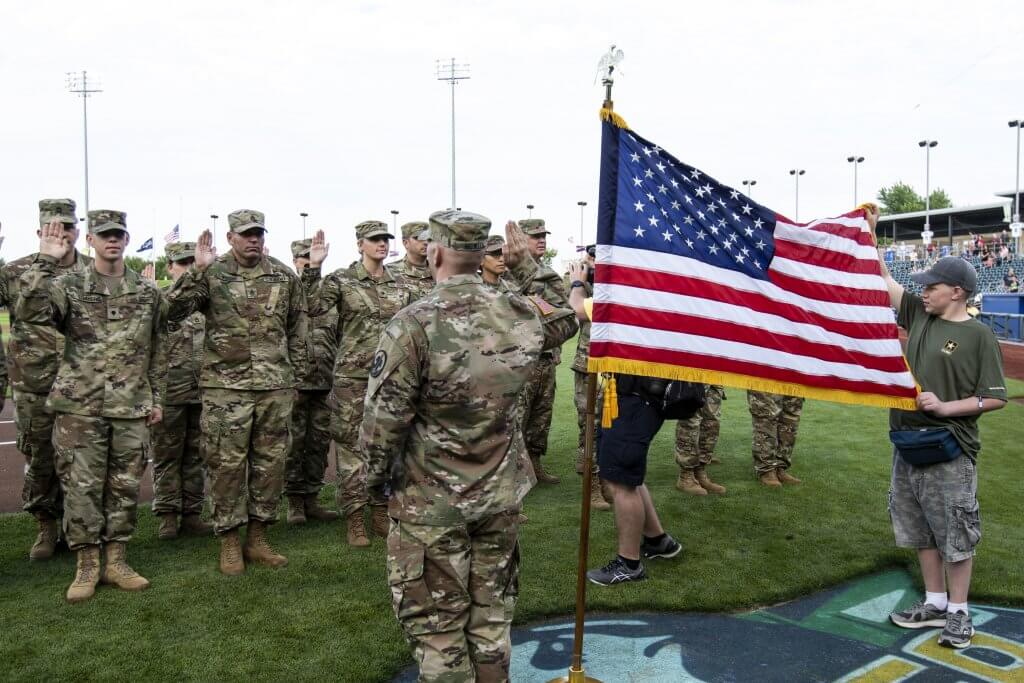The U.S. Army offers soldiers roughly 150 jobs to choose from when enlisting, according to U.S. Army Recruiting Command, with some being specifically for active duty, others for reservists only, and the added option of full time or part time. Sgt. 1st Class Garrett Ehrmann, deputy station commander at the Cape Girardeau Recruiting Station, explains some of the lesser-known MOSs that reservists can consider.
Parachute Rigger – 92R
These reservists bag and pack parachutes while adhering to safety standards. Thus, the job entails the ability to inspect, test and familiarize with all the rigging components of the parachute system. So being mechanically inclined with a diligent attention to detail is paramount.
“If you have OCD this could be a good job for you,” Ehrmann joked, and part of the training means packing their own nylon.
The rigger must also secure all the aircraft supplies for the mission so soldiers aren’t the only occupants that require a safe landing. Military equipment like Humvees, artillery and armor get strapped up, and the same type of procedure must be followed.
Chemical, Biological, Radiological, and Nuclear Specialist (74D)
There are over 200 countries that have chemical, biological and radiological weapons so the need is obviously very pressing. In fact, every single reserve unit around the nation has some type of representative, according to Ehrmann.
The reservists thus serve in teams, and if any alarm is raised, the group arrives with the pertinent equipment to determine the exact exposure.
“This is essential when it comes down to assisting the victims,” said Ehrmann. “If we know the agent, our medical staff would know what to do, how to decontaminate and so forth.”
The position also allows for plenty of professional growth and diversification since there is so much cross training and technological proficiency required.
Psychological Operations Specialist (37F)
The field of psychology attempts to understand the subconscious ailments of an individual in hopes of guiding them toward emotional solutions. On the other hand, Military Psych Ops turns the science on its head in order to explore and exploit possible weaknesses.
“We try to determine how the enemy thinks and feels in terms of cultural, religious, societal or whatever the case may be,” said Ehrmann.
A vulnerability uncovered, the hope is the enemy falters or cowers in some way or even surrenders without a shot. Ehrmann recalled one such case where the Taliban was holed up in a cave, and Psych Ops issued a flawless prescription. The soldiers on site blasted “In a Barbie World” for hours on end until the enemy threw their hands up in surrender.
Army Reserve soldiers won’t have to worry about being the odd person out either. Ninety percent of these positions are filled by reservists, and the civilian experience they often bring is invaluable. There is still a lot of training involved, though, but several key qualifications are not required. Applicants don’t require an airborne physical, they don’t have to take the Defense Language Aptitude Battery tests and there’s no requirement to meet the 31B (Military Police) qualifications.
Human Intelligence Collector (35M)
In this position, you will take part in the debriefing and interrogation of human intelligence. This includes POWs and personnel that are friendly to US objectives. Of course, foreign linguistics will be part of the job and a stint at the Defense Language Institute in Monterey, California is required. In addition, advanced training is required at Fort Huachuca and analyzing the discourse so intelligence reports can be produced is part of this counter intelligence position. Mastery could open numerous opportunities with the DOD such as a research analyst or a statistician.
Cryptologic Linguist (35P)
All across the globe, the military intercepts messages and accurately processing the data is a must. If foreign language, an accurate transcription and translation is paramount but the specialist does more than just provide copy. They must analyze communications, identify geographic location and activity type and be able to recognize changes in transmission modes.
In addition, operating systems that gather intelligence are maintained by these specialists and adds up to a crucial service.
“A Cryptologic Linguist helps provide information to support missions that are helping to ensure that our soldiers are safe,” said Ehrmann.
Therefore, the position requires a good deal of training. A six-18 month training period at the Defense Language Institute is then followed with a year of Advanced Individual Training.

